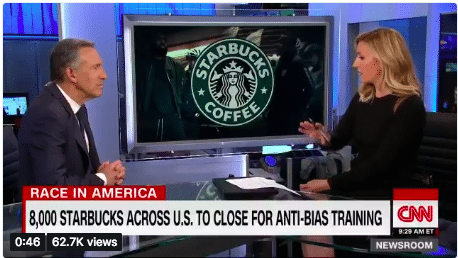
Corporate responsibility leadership or PR spin?
That's a question the mainstream media has been pondering regarding Starbucks' trainings to combat racial bias in its employees. The coffeeshop giant is shuttering all of its stores across the U.S. for four hours the afternoon of May 29.
The widely publicized training seeks to address criticism Starbucks has faced for an April 12 incident in which two black men were arrested in a Philadelphia store while waiting for a friend.
Media narratives around the trainings have been mixed, to say the least.
Quartz, as a publication targeted to the business community, focused more on the numbers than the sentiment around Starbucks' calculated risk. By closing its stores for four hours, the company will lose, by Quartz's estimate, only $4.4 million in sales, or "0.02% of the company’s $22.4 billion annual sales last year—barely a drip in the latté."
But the New York Times' Andrew Sorkin was somewhat more complimentary. Sorkin opened his piece "Why Starbucks’s Bias Training, Despite Skepticism, Is an Important Start" with quotes from organizers working to combat racism who worry about the training's long-term impact. Sorkin also said there was "undoubtedly a public relations aspect" to the training.
Sorkin also wrote that in his research discussing race relations with top executives at other companies, he "found it hard to find [a company] that has taken on the issue of race so directly, with so many employees."
CNN, on the other hand, let Starbucks' media relations team take the lead, quoting an open letter from Starbucks executive chairman and founder Howard Schultz. The open letter ran as a full-page ad in the New York Times, USA Today and two Philadelphia newspapers.
CNN's Poppy Harlow opened an interview with Schultz by describing several details of the training (presumably sent to the network by Starbucks' media team before the interview). Schultz's first talking point onscreen highlighted the fact that all of Starbucks' leadership team had participated in the same training, intimating that true change has to start at the top.
Communications professionals would be wise to monitor Starbucks' latest initiative and the public's response, especially the specificity with which details of the trainings have been disclosed to journalists.
As Sorkin put it, "whatever happens, someone always has to go first." While a four-hour training may be a far cry from a complete transformation, communicators now have a very public industry example to push their own senior leaders toward—and to continue to build upon.
Follow Sophie: @SophieMaerowitz
